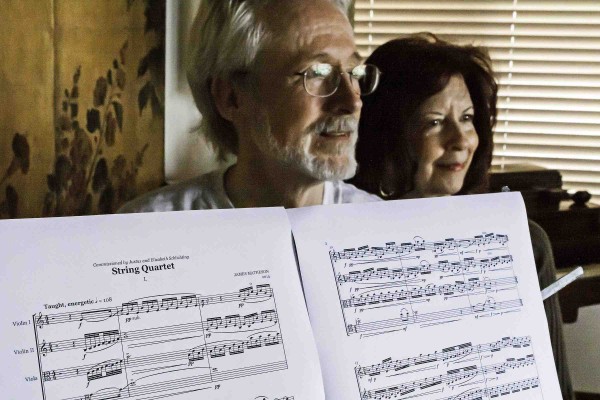
He played the trombone in high school and still plays a little piano even though lessons didn’t take when he was young. In middle-age, Justus J. Schlichting took up the cello and now advocates and commissions contemporary classical music.
His passion for music, ranging from Mozart to pop and jazz crossovers, remained a constant for Schlichting, a former filmmaker, advertising executive and retired computer program administrator at UC Irvine.
“Now my only job is going to concerts and, after 45 years of being involved in music, I want to commission music,” he said. “In order for music to remain vibrant, new music has to be composed.”
To date he and his wife Helen, local residents of 36 years, have commissioned nearly a score of works from various composers, some of which have been heard while others slid into obscurity.
The couple helped underwrite concerts at the just concluded Laguna Beach Music Festival by yMusic, a Brooklyn-based sextet whose repertoire includes works by composers who the Schlichtings have also tapped, such as Andrew Norman. “I admit to being a booster for those kids; after all only 2.8 percent of record sales are classical music,” he said. Helen, also known in music circles as Elizabeth Schlichting, was unable to participate in interviews for this article.
Next up, the St. Lawrence String Quartet on Feb. 19 will perform the premiere of “String Quartet,” commissioned by the Schlichtings for the Segerstrom Center for the Arts’ chamber music series. Composer James Matheson’s work shares the program with two 18th century works for string quartet by Joseph Haydn and Erich Korngold’s String Quartet No. 3 in D, composed in 1944.
The 44-year-old Matheson played in a rock ’n’ roll band in high school and acoustic and electric guitar while in college. He discovered the expressive possibilities and richness of classical music while taking classes in 20th century classical music at Pennsylvania’s Swarthmore College. “With all the impetuousness of an 18-year-old, I started writing music,” recalled Matheson, who lives in Brooklyn.
Nearly anything can spark a composition, says Matheson, describing inspiration from a thought, a feeling, a work of art or a journey to hilly Umbria, Italy, that provided the foundation for “String Quartet.” He wrote the piece after returning home to Brooklyn, finishing it less then three weeks before its premiere. “The String Quartet had many ideas in the beginning that I rejected; they did not lead to the kind of piece I wanted to write and then one stuck,” he said.
“The process of writing music is much like that of writing a novel, three steps forward, three steps back. It took three months to write the beginning and then I had to come up with the next 25 minutes.” Altogether the work is 30 minutes long.
So how does a composer gain commissions? “Sometimes an orchestra taps you on the shoulder and asks for a piece; more often it requires special connections,” he said.
For example, the Chicago Symphony Orchestra and the Los Angeles Philharmonic co-commissioned a violin concerto. At a rehearsal for that concerto at Disney Hall, Matheson and Schlichting met.
“We became friends with mutual interest: I want to write music and he wants people like me to fulfill their dream,” said Matheson.
“I have enormous respect for groups that take on new music. New work is hard since there is no precedent on how to play it,” Schlichting said.
Schlichting said that for $25,000 and up, patrons can commission music through the LA Philharmonic. Others may want to join “Sound Investment,” the LA Phil’s commissioning club where for $300 members can hear three presentations of music and lectures illuminating the art and process of composing.
Matheson said that knowing that he would write a work for Stanford University’s ensemble in residence gave him confidence that it would be played at the highest possible level.
Aaron Egigian, senior director of music programming at the Segerstrom, told Schlichting that the St. Lawrence String Quartet was looking for a composer and he suggested Matheson. The match became reality.
“The Schlichtings have been long-time subscribers to the chamber series and expressed their desire to participate in commissions to give something back to the music community,” said Egigian.
Chamber music allows listeners to eavesdrop on an intimate musical conversation between four or five musicians, each instrument distinctly heard. “The challenge for the composer lies in writing music for this limited force, to take the group to a place similar to that offered by a Mahler symphony. The composer has no place to hide; every note has to count,” Egigian said.
And why does “String Quartet” appear to be untitled? Matheson said that titles are always a struggle since it’s hard to pinpoint any one passage that can summarize an entire piece. “Let’s say it’s a journey but it’s hard to describe what kind. Audiences will be able to connect with the music and come up with their own references,” he said.
Watch the St. Lawrence’s humorous take on “String Quartet” at https://www.youtube.com/watch?v=lT2w9CukuZ8





[…] by Laguna Beach Live and underwritten by Justus J. and Helen Schlichting, “Imir” was inspired by Laguna’s proximity to the ocean and based on an ancient Nordic myth […]
[…] Beach music impresario Justus Schlichting is one of the group’s founding directors as well as president of Bridge to Music, the board […]